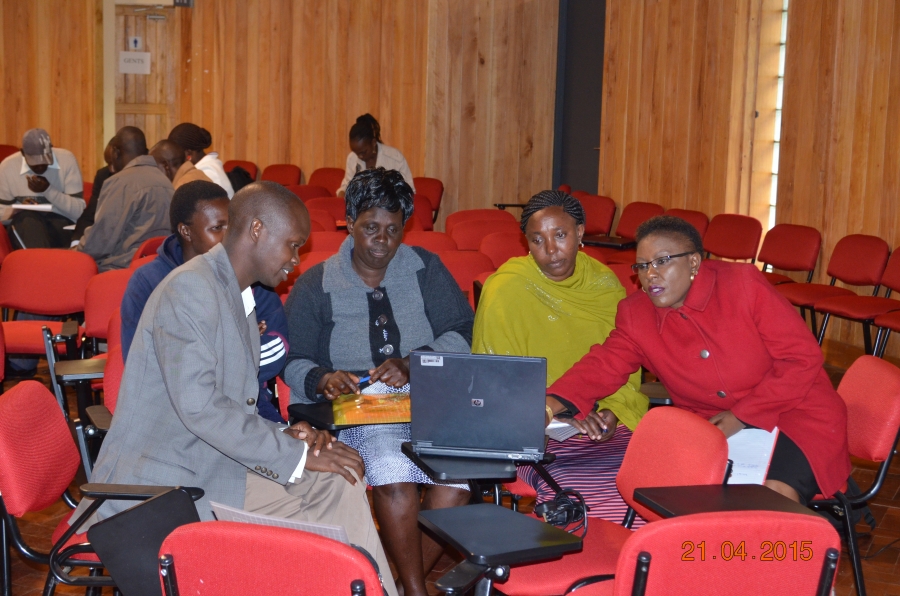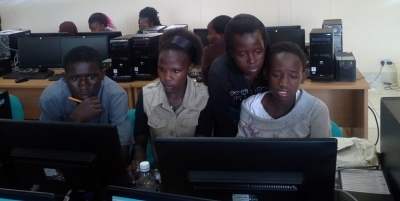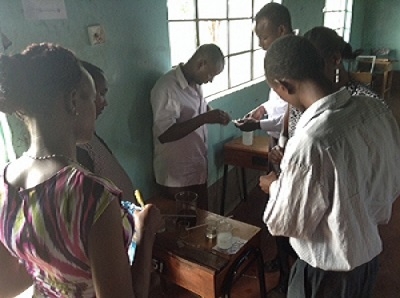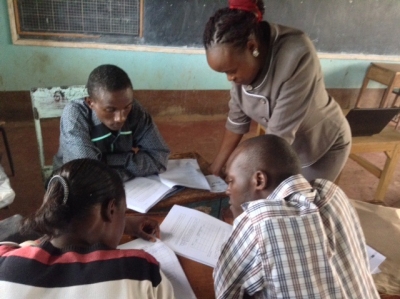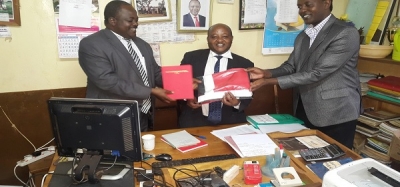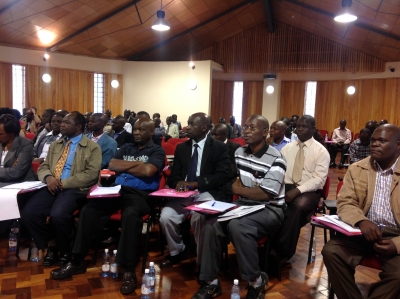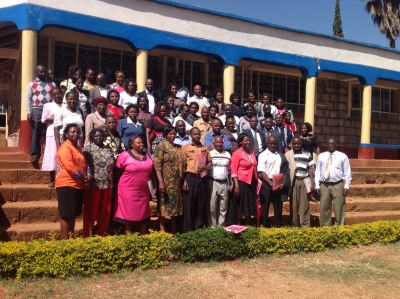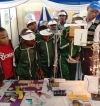CEMASTEA News 174
Children categories
CEMASTEA is currently hosting iMlango for a one week Training of Trainers. The training is attended by approximately 45 participants. The aim of the training is to introduce the teachers to basic components of iMlango, like the use of Maths-Whizz; the Virtual Online Maths Tutor for 5 to 13 Year Olds, VSAT, Ubuntu, sQuad Card and iMlango portal. These skills are to be used to help improve the education experience and to help communities access the digital economy.
|
|
 |
Who is iMlango?
iMlango is a learning programme developed for African schools, with its First Phase mobilising now in Kenya. It delivers digital access, smartcard-based attendance monitoring and online learning tools to primary schools. This First Phase is delivering improved education outcomes to 150,000 children - including 50,000 marginalised girls - in 195 schools.
You can follow their story and updates on their website http://www.imlango.com/
CEMASTEA is currently housing Innovation Kenya in the ICT laboratory, conducting a GMin Innovate Challenges (InChallenges) program which is a national invention challenge for youth in Sierra Leone, Kenya and South Africa. The program runs for 3 weeks starting 13th April, ending 1st May, 2015.
 |
 |
The InChallenges program elicits project proposals from youth around the country and offers design workshops, seed funding, and mentorship to select finalists in order for them to develop their concepts into tangible solutions that positively affect their community. The InChallenges program enhances critical and creative thinking, promotes civic engagement, strengthens STEAM literacies and develops entrepreneurship and leadership skills.
Launched in 2012, the InChallenges program has received close to 800 project proposals to date. Over 200 youth between the ages of 13-18 have created over 70 working prototypes that tackled pressing challenges in their local communities including agriculture, environment, art, communication, health, sanitation and energy. Over 50% of participants are girls and 90% of students have pursued higher education or entrepreneurship after participation in InChallenges.
Through SMASE INSET teachers experience how to conduct activities and experiments in schools with limited resources and infrastructure.In this picture participants carry out experiments in biology from a classroom.In SMASE we believe in developing teachers capacity to be innovative in their teaching to arouse and sustain learner interest through active learning strategies.
Hellen Mutundu a county SMASE INSET trainer conducts a biology session on development of manipulative,observatory and recording skills in learners at Isiolo boys ,Isiolo county.She is now cascading training to other teachers of biology who shall apply the skills in their classes.This is the cascade system of INSET as used in the SMASE program.
The INSET participants are teachers with a teaching experience of between 1-6 years.The discussion were quite informative.They found the discussion on identifying scientific concepts from the content most informative.They Recognised and appreciated the importance of creating learning situations to aid students to understand the concepts.It is evidence of deeper learning.
CEMASTEA Nationl Trainers, Mr. Waibochi P.N. (left) and Mr. Kiruja G.K. (right) presenting the national flag and a copy of the constitution 2010 and other materials to the Principal Kihuyo Secondary School in Nyeri, Mr. Kiumba J. Kibe (centre) when they paid a courtesy call to the school in March 2015 as part of CEMASTEAs Corporate social responsibility.
Jubilee Government is committed to introducing ICT integration Education starting from Primary level and CEMASTEA has a big role to play in this noble goal. This is in recognition of the critical function of ICT integration in education as one of the 21st Century skills. It is also in conformity with Sessional paper No. 14 of 2012 which recognizes ICT as a major vehicle in teaching and learning process. CEMASTEA thus is conducting training on ICT integration in INSET activities in different counties. This is has been an ongoing process since last year, 2014. The training includes 50-100 participants with a blend of ICT champions, District Trainers, teachers for science, languages, technical, humanity subjects and other stakeholders. The duration of the training is one week and counties are expected to cascade the training to the rest of teachers and other officers.
The following is the teachers schedule to be used for the month of March and April.
ICT INTEGRATION IN TEACHING AND LEARNING TRAINING FOR TEACHERS SCHEDULE
|
DATES |
COUNTY |
VENUE |
|
30th Mar – 3rd Apr 2015 |
Nandi |
Kapsabet Girls |
|
30th Mar – 3rd Apr 2015 |
Meru(Kaaga) |
Meru Technical Training institute |
|
30th Mar – 3rd April, 2015 |
Meru (Kangeta Girls) |
Kangeta Girls |
|
13th-17th April, 2015 |
Taita Taveta |
Bura girls |
|
13th-17th April, 2015 |
Kisumu |
Kisumu Girls |
|
13th – 17th April, 2015 |
Narok |
Maasai Girls |
THEME:
Enhancing Learner Growth in Mathematics and Science through Innovative Activities
PARTICIPANTS
There is an ongoing National Inset Training of a total number 120 participants with 1-6 Years of Teaching Experience in Mathematics and Science Teachers from the following county;
|
Dates |
County |
Centers |
No. Participants |
|
15th to 20th March 2015 |
Butere / Mumias, LugariKakamega N/ KakamegaC/Kakamega S/ Kakamega E |
4 |
48 |
|
Kirinyaga |
3 |
36 |
|
|
Siaya, Bondo/Rarieda |
3 |
36 |
|
|
Total |
10 |
120 |
Module two course objectives are to:
- Discuss and share experiences on implementation of 2014 INSET at
- Sub-County level INSET;
- School level INSET (lesson study)
- Discuss and share successes and opportunities for improvement in mathematics and science classrooms in the year 2014 on:
- The practice of ASEI-PDSI and;
- ICT integration in lessons
- Enhance the ability of participants to:
- Develop Manipulative, Observation and Recording (MOR) skills in learners during mathematics and science lessons and;
- Encourage, Capture, and Use (ECU) learner’s ideas in teaching and learning mathematics and science concepts for learner growth
- Strengthen subject content mastery through appropriate learning activities
Lesson Study held in Embu East County; Mufu Zone
A lesson study was conduced in Sacred Heart, Kyeni from 23rd to 27th February, 2015.


Student listening keenly during lesson



Lesson Observation Materials
CEMASTEA is partnering with the International Business Machines (IBM) to implement the Teachers TryScience (TTS) Programme. The aim of the programme is to capacity-build teachers by providing resources to strengthen instruction and better prepare students for the 21st Century jobs; many of which will be increasingly in STEM. The 3rd Cohort workshop whose theme was “Deepening Understanding of ICT Integration Using TTS Materials” was held at CEMASTEA on 17-18 February 2015. The workshop brought together 60 mathematics and science teachers from 30 schools spread across six counties namely Kisumu, Kwale, Nyandarua, Samburu, Taita-Taveta, and Vihiga. It was opened by Mr. Stephen Njoroge, Director CEMASTEA and closed by Ms. Mildred Otsieno; IBM’s Corporate Citizenship & Corporate Affairs Manager, Marketing & Communications for East Africa.

IBM-CEMASTEA Teachers TryScience Cohort 3 participants pose for a group photo after
the Workshop with Ms. Mildred Otsieno (IBM), Patrick Kogolla (CEMASTEA) and
Rebecca Kathure (CEMASTEA)
The objective of the workshop was to:
- Strengthen teachers’ ICT skills and,
- Assess suitability of the TTS content for Kenyan curriculum and national goals.
The workshop also promoted national integration and cohesion by providing an opportunity for teachers across six counties to interact and create friendship. Key areas covered included:
- 21st Century Skills and Approaches
- Project Based Learning
- Understanding Science, Technology, Engineering and Mathematics (STEM) Approach through TTS



